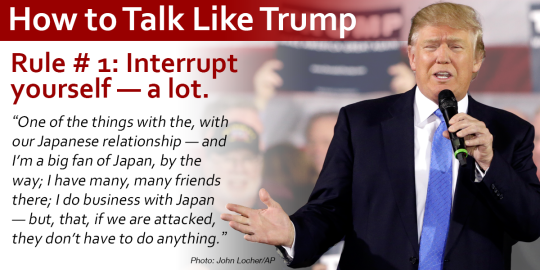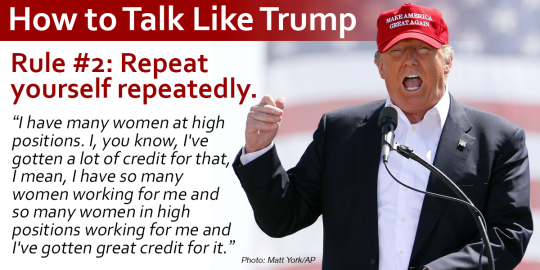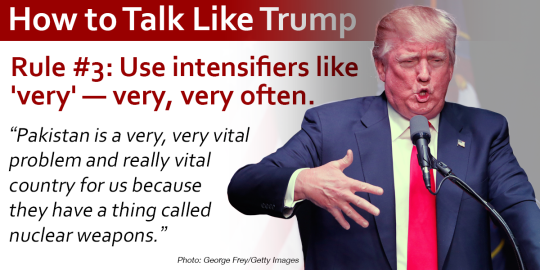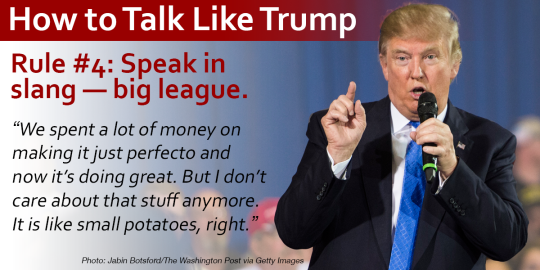The strange power of Donald Trump’s speech patterns
Never mind what Donald Trump says. Never mind the Mexican “rapists,” the “total and complete shutdown” of Muslims entering the United States, the “blood coming out of” Megyn Kelly’s “wherever.”
Perhaps the most peculiar aspect of Trump as a politician — and, in some ways, the most powerful — isn’t what he says, but how he says it.
Over the years, America has produced its fair share of rabble-rousers and demagogues; certain politicians have always said offensive things. But when Trump talks, he doesn’t sound like any other presidential candidate in U.S. history. It’s not just his pungent Queens accent; it’s not just his short, simple, fourth-grade-level sentences. It’s the novel syntax. The free-form grammar. The repetitive cadence. The eccentric phrasing.
“This is a story that seems to be more and more happening,” Trump said of the March 22 bombing in Brussels.
“So, just to sum up, I would do various things very quickly,” he said near the end of his presidential announcement speech.
“I know words,” he said in South Carolina late last year. “I have the best words.”
At times, Trump seems to be speaking a different language than the rest of the political world. Sure, Trumpese may be derived from American English. Yet it doesn’t appear to obey the same set of rules.
Which is not to say that it doesn’t obey any rules whatsoever.
At this point, Trump has become such a fixture on TV that it’s easy to take his speech for granted; his barbaric yawp is the soundtrack of 2016, for better or worse.
But recently, I took a step back and tried to listen with fresh ears — to search for the tics and traits that define Trump’s way of talking and make every word he utters seem so distinctively Donald.
I discovered two things. First, there is definitely a pattern to Trump’s patois. And second, whether deliberate or not — and there’s reason to think it may be more deliberate than it seems — the man’s style of speaking has developed into a remarkably effective delivery mechanism for his message. No matter how much the media may like to mock it, Trumpese is helping Trump more than it’s hurting him.
*****
The first thing to note is that whenever Trump talks, it’s really Trump talking. He doesn’t employ speechwriters. He rarely relies on teleprompters. He barely even uses notes. As David Von Drehle recently reported in Time magazine, Trump basically “improvises his speeches.”
“It’s more work than reading a script, Trump says, but doing so allows him to give and take with the audience, to lose himself in the moment, orchestrating emotions like a maestro,” Von Drehle explained.
As a result, Trump’s linguistic quirks come through loud and clear — if you’re paying attention.

Digression
Perhaps the most marked characteristic of Trumpese is the way its sole speaker is always veering off on mid-sentence tangents — to provide real-time color commentary on his own remarks; to revise, amend or even contradict his previous thought; to assure his audience that he “loves” the person, country or ethnic group he just mentioned, or vice versa; to say whatever happens to pop into his head at any given moment. Even his parentheticals have parentheticals.
“Trump’s speech is a constant stream of asides and ‘by the ways,’” says Jeff Shesol, a former speechwriter in the Clinton White House who founded West Wing Writers in 2001. “In the context of a presidential campaign, this is not only an anomaly stylistically but substantively, in that, just as he feels absolutely no obligation to finish a thought or complete a sentence, he also feels no obligation to actually tell you what he’s going to do in terms of policy.”
The examples are endless.
“You know, one of the things with the, with our Japanese relationship, and I’m a big fan of Japan, by the way,” he said during a recent foreign policy interview with the New York Times. “I have many, many friends there. I do business with Japan. But, that, if we are attacked, they don’t have to do anything.”
“Perhaps there are two Donald Trumps,” the tinsel-haired mogul confessed after Ben Carson said the same. “I’m somebody who is a thinker. I’m a big thinker.” Seconds later, however, Trump abruptly reversed course. “I don’t think there’s two Donald Trumps,” he said. “I think there’s one Donald Trump.”
And here’s a particularly digressive passage from Trump’s July 21, 2015, speech in Sun City, S.C. :
“Look, having nuclear — my uncle was a great professor and scientist and engineer, Dr. John Trump at MIT; good genes, very good genes, OK, very smart, the Wharton School of Finance, very good, very smart — you know, if you’re a conservative Republican, if I were a liberal, if, like, OK, if I ran as a liberal Democrat, they would say I’m one of the smartest people anywhere in the world — it’s true! — but when you’re a conservative Republican they try — oh, do they do a number — that’s why I always start off: Went to Wharton, was a good student, went there, went there, did this, built a fortune — you know, I have to give my, like, credentials all the time because we’re a little disadvantaged — but you look at the nuclear deal, the thing that really bothers me — it would have been so easy, and it’s not as important as these lives are (nuclear is powerful; my uncle explained that to me many, many years ago, the power and that was 35 years ago; he would explain the power of what’s going to happen and he was right — who would have thought?), but when you look at what’s going on with the four prisoners — now it used to be three, now it’s four — but when it was three and even now, I would have said it’s all in the messenger; fellas, and it is fellas because, you know, they don’t, they haven’t figured that the women are smarter right now than the men, so, you know, it’s gonna take them about another 150 years — but the Persians are great negotiators, the Iranians are great negotiators, so, and they, they just killed, they just killed us.”

Repetition
All politicians repeat themselves. Stump speeches vary little from stop to stop; talking points are trotted out at every opportunity. Marco Rubio famously recited his line about “dispel[ling] this notion that Barack Obama doesn’t know what he’s doing” four times at the New Hampshire debate in February.
But Trump repeats himself in a different way. He repeats phrases one after the other, often in the same sentence — not as deliberate parallelism but as a compulsive placeholder. It’s almost as if he can’t bear to stop talking, even for a second, so, instead, he repeats what he just said until he figures out what to say next.
“Nearly every example of his rhetoric that I’ve looked at has this repetitive cadence, to a degree that is strikingly different from other politicians of this era,” says Mark Liberman, a linguist at the University of Pennsylvania.
For instance, his March 25 conversation with the New York Times:
“Many people in countries that you think are our allies are giving ISIS tremendous amounts of money, and it’s going through very dark banking channels. And we should have stopped those banking channels long ago and I think we’ve done nothing to stop them, and that money is massive. Massive. It’s a massive amount of money. So it’s not only from oil, David, it’s from also the bank, the bank. It’s through banks. And very sophisticated channels. They call them the dark channels. Very sophisticated channels.”
Or his Nov. 16, 2015, interview with “Morning Joe”:
“We have a president that doesn’t even use the term and won’t use the term
‘radical Islamic terrorism.’ He doesn’t want to use the term. Hillary Clinton, the —didn’t want to use the term the other day in the debate — which was a ridiculous and terrible debate, frankly, a joke — but she didn’t want to use the term, she refused to use — all three of them refused to use the term ‘radical Islamic terrorism.’ They — they just can’t say it. They absolutely can’t say it.”
Or an interview with “Face the Nation” on Aug. 9, 2015:
“I have many women at high positions. I, you know I’ve gotten a lot of credit for that, I mean, I have so many women working for me and so many women in high positions working for me and I’ve gotten great credit for it.”

Intensifiers
Trump has never been prone to understatement, and much of his campaign chatter — like pretty much everything else he’s said throughout his career — consists of superlatives (usually as part of a boast or an insult). “I will be the greatest jobs president that God ever created.” “Hillary Clinton was the worst secretary of state in the history of the United States.” “I would use the greatest minds. I know the best negotiators.” In Trumpese, everything is either “the best” or “the worst.” There is no in between.
But Trump’s addiction to hyperbole goes deeper than superlatives; it also permeates the little words he uses to modify his adjectives and adverbs. In linguistics, a grammatical expletive that increases the emotional content of an expression is known as an intensifier. “Very” is the basic intensifier; others include “so,” “such,” “really” and “totally.”
Trump is obsessed with intensifiers.
“You have to be very vigilant as to who you have and where you’re coming from. The assimilation is very, very difficult.”
“We will do very, very well, very, very well.”
“There is so much wealth out there that can make our country so rich again, and therefore make it great again.”
“If I become president, oh, do they have problems. They’re going to have such problems.”
“The terrorists are totally winning.”

Informality
Presidential language has grown increasingly colloquial in recent years, but Trump is in a class of his own. It’s not just his public use of the S word,the F word, the A word and the P word — a phenomenon that has been much discussed already. Nor is it his reliance on the word “guy” to describe politicians and world leaders — a term he used 91 times in a single week last year, according to the New York Times — or his penchant for calling everyone and everything “stupid.”
Trump’s informality extends beyond vulgarity and disrespect. His speech is peppered with more idiomatic expressions than any candidate in recent memory, and the slang he prefers tends toward the old-fashioned. “Big league” is his favorite — as in, “Iran is taking over Iraq, and they’re taking it over big league,” or “I’m a believer, big league, in God” — but he’s also been known to dismiss some things as “small potatoes” and insist that other things are going “down the drain.”
“We spent a lot of money on making it just perfecto and now it’s doing great,” Trump said in February about his investment in an Irish golf course. “But I don’t care about that stuff anymore. It is like small potatoes, right?”
Also worth noting: Trump is the only White House hopeful who regularly replaces the verb “have” with “got,” a hallmark of American street talk.
“Because we got to make the country rich,” he said in his June announcement speech. “We got $18 trillion in debt. We got nothing but problems. We got a military that needs equipment all over the place. We got nuclear weapons that are obsolete.”

Punch lines
When Republican speechwriter Barton Swaim examined Trump’s sentences in September, one structural anomaly stood out.
“They don’t work the way modern political rhetoric does,” Swaim explained. “They work the way punchlines work: short (sometimes very short) with the most important words at the end.”
Most politicians are habitually careful when they speak in public, with rhetoric that tends toward abstraction and sentences full of subordinate clauses and qualifying phrases.
Trump speaks more like a comedian, making sure to go out with a bang. In fact, he often rearranges the beginning of his sentences awkwardly so he can end strong.
To demonstrate how this works, YouTuber Evan Puschak recently dissected a 220-word, one-minute answer that Trump gave to Jimmy Kimmel when Kimmel asked about Trump’s Muslim ban. Nearly all of Trump’s sentences terminated with a pointed, punchy word that contributed to his overall theme: “harm,” “dead,” “die,” “injured,” “problem,” “bedlam.” And instead of saying, “You can’t solve a problem until you find out what the root cause is” — the natural way to structure that sentence — Trump brought the “is” forward to end on “root cause”: “You can’t solve a problem until you find out what’s the root cause.” He did the same thing a few seconds later as well. “I want to find out,” he said, “what is the problem.”
Trump is so fond of this technique that even when his sentences don’t end with punch lines, he simply follows them with a one- or two-word declaratory judgment — both in real life and on Twitter. One of his favorite codas is “sad!”
“Because of me, the Republican Party has taken in millions of new voters, a record,” Trump once tweeted. “If they are not careful, they will all leave. Sad!”
*****
The list of Trump’s linguistic eccentricities goes on. He often speaks in the imperative mood, instructing his listeners to “look” at something (“Look at what happened in Paris. Look at what happened last week in California.”) or commanding them to “believe” him, “trust” him or “mark [his] words” (in lieu of trying to convince them that what he’s saying is, in fact, believable).
“I will build a great, great wall on our southern border,” Trump said in his announcement speech. “And I will have Mexico pay for that wall. Mark my words.”
“That’s what politicians do: all talk, no action,” he told AIPAC earlier this month. “Believe me.”
Many candidates foster a feeling of collective action by referring to themselves and their campaigns — or themselves and their supporters — in the first-person plural. That was the logic behind Barack Obama’s famous 2008 slogan, “Yes We Can.” Trump, however, prefers the second person, implicating his listeners in what he’s saying as if they’ve already agreed.
“They want Sharia law,” he said last week, referring to the Brussels bombers. “And you know, you say to yourself, at what point, how much of this do you take?”
After weeks of close listening, I’m convinced that Trumpese has its own skewed structural integrity. But what do Trump’s speech patterns add up to? What effect are they having on voters? And how big a part are they playing in his political success?
As someone who writes for a living, I’m tempted to dismiss as offensive and ignorant — even ugly — any speaking style that flouts the laws of language as flagrantly as Trump’s.
But Trumpese is clearly working for its creator (at least among the 40 percent of Republican primary voters who support him). It isn’t just consistent. It’s perfectly calibrated — and calibrated may not be too strong a word — to serve Trump’s political needs.
When Trump digresses, he’s signaling that he is unscripted and therefore authentic. When he remarks upon his own remarks, he is emphasizing his outsider status by putting distance between himself and the usual rituals of political campaigning — delivering a linear speech, begging big donors for money and so on. When he deploys slang, he is showing how different he is — how much more down to earth he is — than your typical politician; when he deploys vintage slang, he is identifying himself with an earlier era — an era in which America, presumably, was “great.” When he revises or even contradicts himself in real time, he is showing that he is confident enough to think out loud. When he speaks in the imperative mood, he seems authoritative; when he speaks in the second person, he implies that you and he already agree, no matter how outrageous the proposition.
“The looseness of Trump’s language just reinforces that there’s a kind of perverse integrity to it,” Shesol, the former speechwriter, says. “You might not like it. But he is who he is and he’s happy to tell you about it. He’s rich; he’s beyond being bought. There’s nothing he wants.”
These are the tics of a salesman. When Trump uses intensifiers, he is amplifying the emotional essence of his pitch; he is underscoring the fact that he is selling a feeling (rather than a policy proposal). When he says, “Believe me,” he is shining a spotlight on the only product that matters: Donald Trump. And when he repeats himself or ends his sentences with punch lines, he is making sure that digitally distractible, attention-deficient voters get the point, much like a human version of those radio ads for mattresses that repeat the same 1-800 number nine times. He is also giving listeners the “impression,” as linguist Liberman puts it, “that he’s confident and in control of knowledge and ideas and attitudes.”
“Trump never uses ‘filled pauses’ like ‘uh’ or ‘um’ and rarely has silent pauses of greater than minimal length,” Liberman says. “I’d speculate that at some point many years ago, he decided that ‘ums’ and ‘uhs’ and dead air were bad things. He began practicing to avoid them, and he found that repeating or paraphrasing medium-sized chunks was a useful method.”
Liberman’s supposition raises an interesting point: Has Trump decided to speak in this strange but advantageous way, or did Trumpese merely develop over time as the organic language of a man driven to sell himself to the public? At first I leaned toward the latter. But then I was struck by Trump’s ritualistic response to the fracas earlier this year over former Ku Klux Klan leader David Duke.
When Duke first voiced his support for Trump, the latter pretended he’d never heard of the former. But then the press pounced and Trump was forced to backtrack. In response, he kept repeating a curious phrase: “I disavow.”
He said it at press conferences. He said it on Facebook. He said it on Twitter. He said it on “Good Morning America.” And every time, the wording was the same: subject (“I”), verb (“disavow”) and a conspicuous blank space where the object of his disavowal should have been. Trump never made reference to who or what he was disavowing. Nor did he ever phrase his condemnation a different way.
“I don’t think this was a mistake,” Kevin Drum wrote at the time. “Technically, Trump is in the clear. He has disavowed David Duke. But there is no sound bite or video snippet that shows him clearly criticizing either Duke or the KKK or white supremacist groups in general” — all of them potential supporters.
So, intentional or not, one thing is clear. This guy Trump is — maybe not the same as, you know, Barack Obama — but he’s a good talker. A very good talker. The voters — they love the way he talks. Love it. I mean, something is going on with him, OK? You look at the way he talks and you say to yourself: Boy, can that guy talk. Big league.
(Cover tile photo illustration: Yahoo News, photos: George Frey/Getty Images, Matt York/AP, John Locher/AP)

